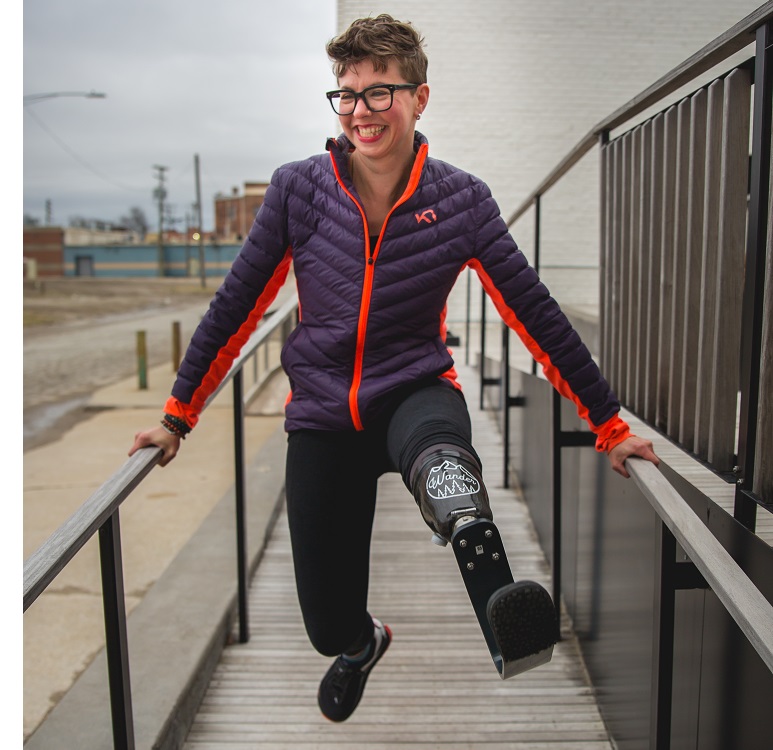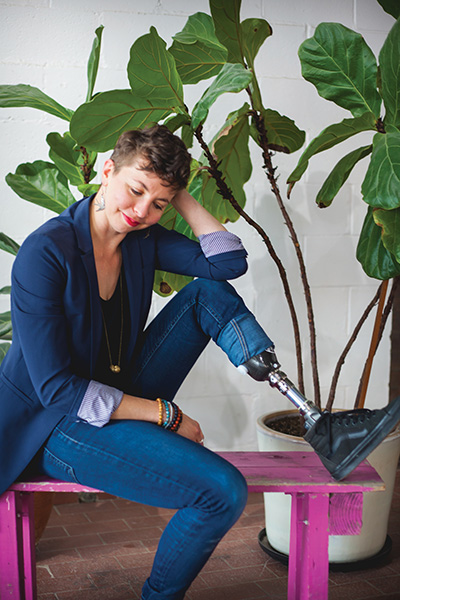When she felt close to rock bottom, Elayna Alexandra turned to life coaching. Now she feels the sky’s the limit.
By Larry Borowsky
lmages by Laura Suprenant
As she explains the difference between psychotherapy and her own work as a life coach, Elayna Alexandra feels obliged to issue a disclaimer. “I don’t want to sound like I’m bashing therapy,” she says. “I really believe it is a useful tool.”

Over the years, therapy has helped Alexandra address a range of challenges, including depression, substance abuse, chronic pain, and a congenitally unhealthy limb that was finally amputated last spring. But when she discovered life coaching a few years ago, the 39-year-old Alexandra gained a fundamentally new understanding of how mental and emotional healing occurs.
“Broadly speaking, therapy looks at people as having some sort of pathological defect,” she says. “It’s about diagnosing what’s wrong with you and then fixing it. An ontological life coach doesn’t look for where you’re broken, because everyone’s broken on some level—and at the same time, we are all whole.”
Coaching starts with the idea that people are whole, Alexandra says, and then it asks: How do you work with what you’ve got and create forward momentum? Where do you want to go? How do you thrive?
Here’s another way to put it: A coach helps you figure out how to use your present abilities to shape the future, whereas a psychotherapist is more apt to focus on how your past shaped your present. One approach faces forward, the other largely backward. Moreover, coaching is oriented toward goal-setting and problem-solving. It’s designed to help people achieve a specific objective, resolve a particular conflict, or make a targeted change in habits. And, like a sports coach, a life coach can help you with concentration, motivation, accountability, and persistence, with an eye toward overcoming obstacles and bouncing back from misfortune.
There’s a whole lot of overlap between life coaching and conventional therapy, Alexandra notes. But she thinks coaching offers particular benefits to people dealing with limb loss. Without it, she might not have had the courage to choose amputation in 2021. Nor could Alexandra have dealt with the series of complications that arose after her surgery, and the corresponding doubts about whether she’d made the right decision to amputate.
“Coaching has had way more impact on me than any of my therapists ever have,” Alexandra says. “It changed the way I thought about myself and understood my identity. It allowed me to put some skills in place where I am treating myself with respect, instead of beating myself up and judging myself.”
ALEXANDRA GREW UP WITH A KEEN INTEREST in psychotherapy, due in considerable part to her congenital limb difference. She was born with psuedoarthrosis, a rare bone disease that orthopedists consider one of the most difficult childhood conditions to treat. By the time she reached adulthood, Alexandra had undergone more than 20 surgeries on her legs. But no amount of bone fusion or rod-and-screw latticework could fix what was “broken” in her, and the healthiest option—amputation—was rejected out of hand by her parents.
“They definitely tried their best,” she says, “but my parents had not done the emotional labor that it takes to raise a child with a disability. When I was a kid, we didn’t talk about disability. I was clearly disabled, but I was never given the chance to pass as anything but able-bodied and try to succeed in an ableist world. If they had made the choice to amputate when I was younger, I quite possibly could have avoided a lot of the struggle in my life.”
Instead she powered through, hiding her physical and emotional pain from others and denying it to herself. Alexandra earned a degree in human science and a master’s in business administration, carved out a niche in marketing and fundraising, got married, and had a couple of kids. She built a successful freelance practice, then gave it up to work full-time for a nonprofit that helps people with disabilities find housing and jobs.

It all looked great on the surface, but internally Alexandra still felt defective—and the burden of hiding her perceived flaws started to crush her. She turned to alcohol as an escape hatch, but that only ensnared her in new traps. Another form of escape—suicide—started to intrude on her thoughts. She asked herself if she even deserved to live without pain. Then, during a corporate workshop in 2018, she had an epiphany.
“My journey of accepting that I have a disability started in a session about biases,” Alexandra recalls. “I started to understand that if I’m masking my disability, what harm am I doing to someone who has a disability they cannot mask? I realized that how I experience myself either gives permission or takes permission away from how others experience themselves. And I wanted to give people permission to be their whole selves.”
That insight, in turn, encouraged Alexandra to accept herself in the truest sense.
“There’s a certain strength that a person with a disability has to carry to survive in an ableist world,” she says. “We can come into that strength in denial or in full acceptance. When we come into that strength in full acceptance of what our challenges are, then we can also show our vulnerabilities. We can also say: ‘Sometimes this really hurts. Sometimes it’s really hard.’”
In 2019 Alexandra started a one-year training program at Newfield Network, a Colorado organization that specializes in ontological coaching. The program appealed to Alexandra because it emphasizes the interrelationship between physical and emotional states—between body and mind.
“One of the big pieces I learned at Newfield is to drop down into my body—which, for pretty much my entire life, I didn’t really want to be in,” she says. “I made a choice to truly connect to my body and understand what it was going through.” When she finally embraced the physical pain she’d been masking for 30-plus years, Alexandra also understood her mental journey with more clarity. “I recognized that I had been in fight-or-flight mode my whole life,” she says. “Mostly flight. My nervous system was so out of whack that I really wasn’t functioning well. I opened myself up to this whole new story that allowed me to really feel my experience.”
ALEXANDRA COMPLETED THE PROGRAM IN EARLY 2020 and emerged a changed woman. Within weeks she committed herself to sobriety. A few months later, she got out of bed one day and tried to stand up, and her body finally said: Enough!
“I could not bear weight on my left leg,” she says. “I could not take a step.” For the first time in years she went to see an orthopedist, who told her the foot was broken in multiple places. “The bone was kind of disintegrating,” Alexandra recalls. The doctor gave her two choices—fuse the bones or amputate—and she fell back on her coaching training as she weighed the options. What are my goals? she asked herself. And how can I best achieve them?
“Part of my best life involves being outdoors, going on hikes, and being physically active,” she says. “And here I have this foot that’s disintegrating. If I choose fusion, that’s not going to leave me in a state where I can climb mountains. And I was holding on to this possibility of maybe being able to run, which is something I’ve never done in my whole life.”
She had a below-knee amputation last February, but the recovery didn’t go as planned. Alexandra had a string of infections and debridements. Her post-surgical pain was intense. Five months later, she had barely started walking on a prosthesis. The loss of mobility undermined Alexandra’s confidence in her ability to care for her kids. She second-guessed her decision constantly: Did I do something wrong? Could I have done something better?
Before coaching she would have disowned her experience, gritted her teeth, and toughed it out. Instead, she let herself feel everything.
“This journey has been surprising, difficult and incredible, and it’s nowhere close to over,” she wrote on Instagram. “There have been moments of elation and moments of harrowing grief that leave me with very little desire to live. . . . Some days it’s hard to feel like it’s possible to keep moving forward. Other days, I am excited and hopeful for the future. This roller coaster of life & recovery is my becoming.”
The thing that got Alexandra through—the “anchor,” in her terms—was the perspective she’d gained from coaching. She kept facing forward, not back; kept moving toward the goals she’d identified; kept clearing away obstacles, trusting the process and herself. In November, eight months post-amputation, she finally received a prosthesis. Three months later, near her first ampuversary, she got a Levitate blade and started learning to run.
Now divorced, she’s working full-time as a certified coach and consultant, drawing on her experience as an amputee to help clients of all kinds. “We all struggle,” says Alexandra, who lives near Detroit. “We all have hardships. Amputation really normalized that for me on a day-to-day basis, which was incredibly powerful. So now I’m sharing that with other people. These are the challenges, and here are some tools that are going to help you.”
If you’re interested in exploring how a life coach might help you live a better life, start with Alexandra’s website at elaynaalexandra.com. She also recommends Better Up (betterup.com), a nationwide network of pre-screened certified coaches, and the International Coaching Federation (coachingfederation.org).




